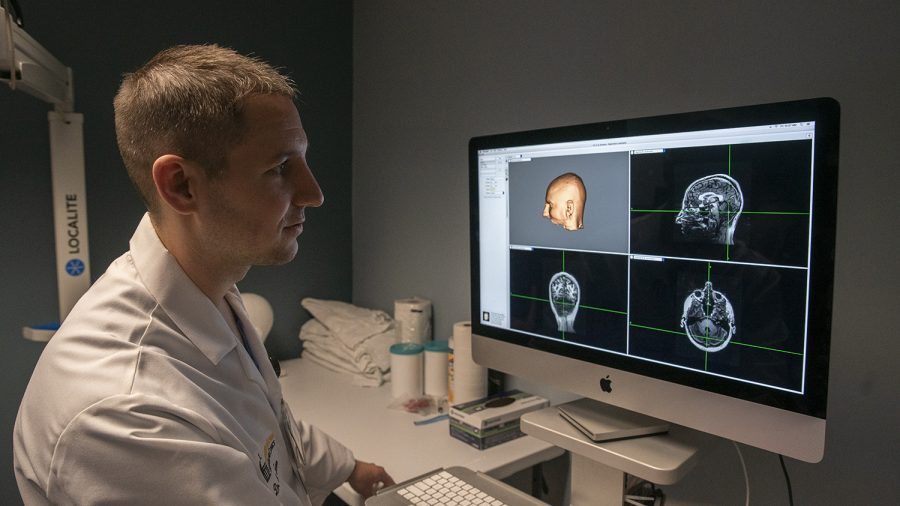New UI clinical trial intended to change brain activity of depression with stimulation
Researchers at the UI have been studying the effects of brain stimulation on patients with depression to change their brain activity.
University of Iowa researcher Nicholas Trapp is operating a monitor for his Transcranial Magnetic Stimulation system on Friday, September 13th, 2019. Nicholas and his team is studying transcranial magnetic stimulation (TMS) and how effective the treatment would be in the cases of bipolar disorder, autism, and schizophrenia.
September 16, 2019
A new University of Iowa clinical trial treats patients who suffer from depression with technology that stimulates activity in a certain part of the brain to treat the mental illness.
University of Iowa Hospitals and Clinics Psychiatrist Nicholas Trapp and his team are studying the effects of repeatedly stimulating the cerebellum — the part of the brain in charge of cognition and planning — to improve negative symptoms in people with brain disorders. The team is using Transcranial Magnetic Stimulation to alter patients’ brain activity.
Transcranial Magnetic Stimulation is a treatment created 30 years ago that uses a magnetic field that can pass through the skin and skull to inhibit parts of the brain and change brain activity, Trapp said.
With new technology called brain-sight, doctors can use 3D reconstructions and infrared light to stimulate exact locations on the brain within millimeters, Trapp said.
By stimulating the cerebellum he said doctors can see induced change and determine if it is therapeutic to the patient.
RELATED: Brain stimulation helps treat Parkinson’s patients, UI researchers say
Patients turn to this method after failing multiple medications and other treatments, Trapp said. He emphasized that Transcranial Magnetic Stimulation requires patients to return to the hospital every day for treatment.
With this clinical trial, the treatment lasts approximately four to six weeks, Trapp said. Stimulation treatment for other mental disorders such as schizophrenia, autism, and bipolar disorder vary in dosage and length, he said.
Trapp said 50 to 60 percent of patients improve with stimulation treatment. However, he said there is no way to know why patients respond the way they do, so additional research is being conducted to figure out which patients would respond to the treatment.
“Right now, we are also looking at patients before and after treatment to see if they can pick up specific biomarkers to figure out what patients will actually respond to treatment,” Trapp said.
Without following safety parameters, repetitive brain stimulation can cause seizures, he said. Other health risks involved would be headaches and migraines, but any symptoms are localized to the part of the brain that was specifically stimulated, Trapp said.
RELATED: Assistant professor earns $2.1 million to continue research on the cerebellum
UI Health Care Research Assistant Benjamin Pace is working alongside Trapp to better understand what changes can be made to brain activity.
“I am really interested in the cognitive neuroscience side of all that is going on here with the [Transcranial Magnetic Stimulation] study,” Pace said.
The researchers follow up with patients two months after receiving treatment to see if the positive effects are still there, Pace said.
University Counseling Services Director Barry Schreier described depression as the second-most common concern for the office behind anxiety.
Suicide is the leading cause of death for people ages 18 to 25, Schreier said, and the university environment can affect students in different ways. For some, he said, college provides structure to their lives and makes them feel better, but the stress of school can trigger others.
On average, Schreier said, students who utilize the service reach their mental-health goals within five or six sessions.
“Medication and counseling are the best approach to mild to severe depression, but as each case is different, [stimulation] has proven [to be] helpful to others,” Schreier said.






